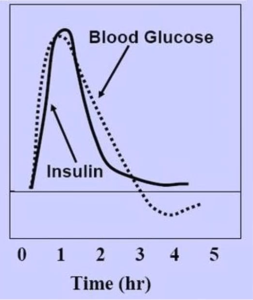
Linking Insomnia, Anxiety, and Indigestion
What do insomnia, anxiety, and indigestion have in common? That may depend on your own physiological uniqueness. But for many individuals with these 3 complaints, chronic cortisol is the link.
What is cortisol and how is it made?
When your brain perceives a threat – either from within or from without – it needs a messenger to spread the alarm and get the body ready for action. So, the hypothalamus stimulates the pituitary to trigger the adrenals to make cortisol from cholesterol.
You might mistakenly believe that cortisol is the enemy. Many call it The Stress Hormone and give it a bad rap. But what many people don’t realize is that cortisol is critical for you to wake up, focus, set goals, meet your deadlines, and even exercise. That’s because it rouses you out of your resting/healing state. It does that by increasing blood pressure and heart rate and raising blood sugars to that you can have energy to mobilize – whether that be dancing, debating, or dodging a bullet!
The problem is that when cortisol output becomes chronic, your body never gets to rest and digest and heal. That’s when you begin to see health issues.
Why do so many people have chronically high cortisol levels?
First, this is a go-go-go world of ongoing crises from sun-up to sundown, with alarms, alerts, and emergencies all clamoring for your attention. Urgencies control your focus. Your body responds intelligently by producing the hormone that will help you meet those demands. Unless you deliberately choose to slow down, shut down, and turn off, your body will continue to produce cortisol day and night.
Second, 60 to 80% of the American diet is refined carbohydrate, everything from Rice Krispies to Wonder Bread, and from French fries to pasta. And that’s not counting chips, candy, or pop! When you eat like that, your body needs cortisol to come to the rescue. Think of it like this:
What happens after I toss a bowling ball 10 feet in the air? Of course! It comes crashing down! Well, blood sugars are the proverbial bowling ball. You launch them into the air by loading up on meals and snacks that are not balanced with appropriate proteins and fats. The laws of nature say that for every action, there is an equal and opposite reaction. So, inevitably, blood sugars plummet!

Your brain can’t tolerate that. It must be guaranteed a constant supply of glucose in order to direct the minute-by-minute management of all your body functions. So, it declares an emergency, and the hypothalamus signals the pituitary to trigger the adrenals to release cortisol to raise blood sugars back up. Cortisol alerts the muscles and the liver to release stored glucose for immediate energy. In effect, when you grab a doughnut, a Kit Kat, or a Pepsi, you stress your body into fight-or-flight.
How does cortisol instigate insomnia, anxiety, and indigestion?
Your body is smart. It knows how to put first things first. If you have a battle to fight, it will energize your muscles, increase your blood flow, and sharpen your vision. But…it will also shut down digestion and keep you alert so you don’t drift into slumber easily. After all, those things are a lower priority than simply surviving! Therefore, people with chronically high cortisol often notice symptoms such as heartburn, bloat, anxiety, and insomnia.
How can you reduce insomnia, anxiety, and indigestion?
Start in the morning by building a slow-burning, enduring metabolic fire. You prevent a cortisol spike by avoiding a blood sugar trough. Figuratively speaking, you have to put coal in your steam engine. What would happen if you tried to run a steam engine train with a pile of newspapers? It wouldn’t work! The train would get 2 feet down the track and stop.
Fruit juices, cereal, white flours, and sweeteners are like newspapers. They burn hot and fast, and extinguish quickly. They don’t power you for the long haul. “Coal” comes from healthy fats such as nuts, seeds, butter, coconut oil, olives, and avocados.
That might mean adding Greek yogurt to your oatmeal, putting an avocado in your green smoothie, eating a couple of eggs with your toast or having a sausage patty with your hash browns. Please, please, please don’t grab a bowl of cereal with skin milk, or run out the door with a granola bar!
Next, when you grab a snack, pair a healthy fat with a high-fiber fruit or vegetable. For example, you might eat hummus and carrots, cottage cheese and peaches, coconut milk and blueberries, olives and baby bell peppers, almond butter and apples, or guacamole and mango.
While there are many factors that contribute to insomnia, anxiety, and indigestion, stabilizing cortisol output with balanced eating can improve these complaints dramatically.

What a great article! Thanks. I know I felt so much better when I stopped eating cereal and started eating a breakfast with protein and fatty.